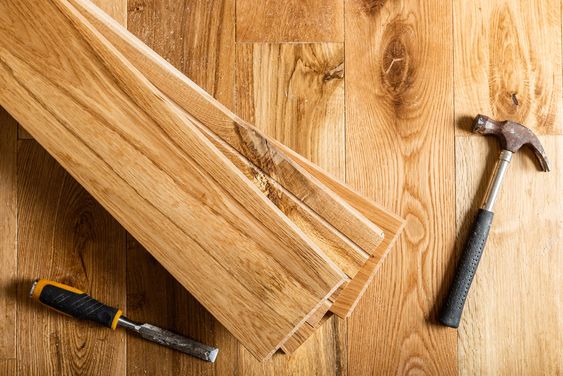
Essential carpentry skills combine the understanding of techniques, materials, and tools needed to turn raw wood into functional and aesthetic structures. Carpentry is an ancient craft that manifests in countless forms from the making of fine furniture to the framework of houses.
Here are the fundamental skills you need to master as a carpenter, whether you’re picking up the trade as a hobby or pursuing a professional career.
Key Takeaways:
- Understanding of Wood Types: Familiarize yourself with different wood types and their properties, which is crucial for selecting the right material for your projects.
- Mastery of Carpentry Terms: Grasp the essential carpentry terms to communicate effectively and understand project requirements.
- Proficiency in Basic Carpentry Techniques: Develop basic carpentry techniques to ensure a strong foundation in handling tools and creating structures.
- Competence in Measuring and Marking: Become adept at measuring and marking, the cornerstone of precision in carpentry.
- Skilled in Using Power and Hand Tools: Acquire the skill to use power tools and hand tools effectively to build and finish carpentry projects with efficiency and accuracy.
- Knowledgeable in Woodworking Joints: Understand woodworking joints to construct durable connections between wood pieces.
- Comprehension of Reading Plans: Learn the importance of reading plans correctly to execute projects according to the blueprints.
- Familiarity with Workshop Safety Practices: Prioritize workshop safety practices to maintain a secure working environment.
Table of Contents
Understanding Wood Types

The type of wood you choose can significantly affect the strength, appearance, and longevity of your project. It’s crucial to understand the characteristics of various wood species – such as hardness, grain patterns, workability, and response to environmental changes.
Be sure to consult our detailed guide on wood types for in-depth knowledge on selecting the perfect wood for every job.
Familiarity with Carpentry Terms

Communicating effectively with colleagues, understanding project requirements, and following written plans require a comprehensive grasp of carpentry jargon. Terms like “stud,” “joist,” “rafter,” and “dovetail” should be part of your vocabulary.
A strong grasp of carpentry terms ensures that you’re on the same page with everyone involved in the project.
Measuring and Marking Prowess

Accuracy in measuring and marking is non-negotiable in carpentry. A slight deviation can lead to gaps, misalignments, or structural weaknesses. Taking precise measurements and marking clearly are skills honed over time but start with a basic understanding and quality tools.
Explore our comprehensive guide to measuring and marking to learn more.
Proficiency in Woodworking Joints
The integrity of most carpentry projects relies on sturdy joints. Knowledge of various joint types, like dovetails, mortise-and-tenon, and biscuits, enables a carpenter to make decisions that will affect the project’s durability and aesthetics.
Mastering the art of creating seamless and solid woodworking joints is a skill that comes with practice and precision.
Expertise in Using Tools

Both power tools and hand tools have roles in modern carpentry. While power tools can save time and energy, hand tools offer finer control and can sometimes provide better results for particular tasks. Start by assembling a basic toolkit and gradually expand as you develop proficiency with each tool.
Our power tools guide for beginners can serve as a great starting point—learn more about using power tools.
Reading Plans and Blueprints

Interpreting technical drawings is a foundational skill. It allows carpenters to construct projects accurately according to specifications. From recognizing symbols to understanding dimensions, the ability to read and interpret blueprints cannot be overstated.
For insights into reading plans and executing projects to precision, check our section on reading plans.
Good Workshop Safety Practices
Safety is paramount in any workshop environment. Being aware of the proper safety protocols, correct use of personal protective equipment (PPE), and maintaining a tidy workspace contribute to preventing accidents and health hazards.
Essential safety tips can be found in our guide on workshop safety practices.
Mastery of Carpentry Skills
| Skill | Details |
|---|---|
| Accurate Measurement | Essential for ensuring that pieces fit together perfectly. |
| Efficient Material Selection | Knowing which wood and fasteners to use can determine the success of a carpentry project. |
| Tool Handling | Using tools properly will improve work quality and safety. |
| Joint Construction | Joints are the cornerstone of woodwork that holds everything together; mastering them is vital for structural integrity. |
| Plan Reading | Carpenters must be able to interpret and follow plans to bring a project to life accurately. |
| Safety Awareness | Understanding how to work safely is essential to prevent accidents and injuries. |
FAQ
What are the most important carpentry skills to learn first?
The most important skills to learn initially are measuring and marking, basic tool usage, and understanding wood types and properties. These foundational skills will set the stage for more complex carpentry work.
How long does it take to become proficient in carpentry?
Proficiency in carpentry depends on the individual’s learning pace, the complexity of the projects undertaken, and the amount of time dedicated to practice. It can take several months to become comfortable with the basics, while mastery of the trade can take years.
Can I learn carpentry skills online?
Yes, many carpentry skills can be learned online through tutorials, articles, and video demonstrations. However, hands-on practice is essential to truly master the skills.
What should be the focus for beginners in carpentry?
Beginners should focus on understanding the properties of different types of wood, mastering basic tool use, learning fundamental joints, and the importance of safety in the workshop.
In the next generation, we continue to delve into more essential skills a carpenter should possess, along with additional details and tips to help you on your carpentry journey.

